- Home
- Michael Wallace
Shattered Sun (The Sentinel Trilogy Book 3)
Shattered Sun (The Sentinel Trilogy Book 3) Read online
Table of Contents
Chapter One
Chapter Two
Chapter Three
Chapter Four
Chapter Five
Chapter Six
Chapter Seven
Chapter Eight
Chapter Nine
Chapter Ten
Chapter Eleven
Chapter Twelve
Chapter Thirteen
Chapter Fourteen
Chapter Fifteen
Chapter Sixteen
Chapter Seventeen
Chapter Eighteen
Chapter Nineteen
Chapter Twenty
Chapter Twenty-One
Chapter Twenty-Two
Chapter Twenty-Three
Shattered Sun
by Michael Wallace
Click here to sign up for Michael Wallace’s new release list and receive a free copy of his fantasy novel, The Dark Citadel. This list is used only to announce new releases and not for any other purpose.
The Sentinel Trilogy
Book #1 – The Sentinel
Book #2 – Dragon Quadrant
Book #3 – Shattered Sun
copyright 2016 by Michael Wallace
Cover Art by Lorenz Hideyoshi Ruwwe
Chapter One
The Hroom general and his young adjutant stood in the loading bay, eyeing the single-seat spacecraft. It sat on a rail in front of them, waiting to be shuttled to the launch tube, there to be hurled from the sloop of war into space. The adjutant gave a worried whistle through her nose slits.
“Lord General,” she said, “I am not sure it’s advisable. Very unsafe. Very unsafe, indeed.”
“Nonsense,” Mose Dryz said. “A skimmer craft is serviceable to five million kilometers, although with the size of that cockpit, I imagine my legs will be in need of a good stretch before I’m through. Perfectly safe, though.”
“That is not precisely what I mean. It’s the cultists. Once they look at you . . .”
“Because I am pale and pink instead of purple?”
Another whistle, but this one turned into a hum that sounded disapproving. “Yes, Lord General. To be perfectly frank, that is exactly what I mean.”
The younger Hroom was Lenol Tyn, from one of the most important families in the empire. Her father was a senator, her mother a cousin of the empress herself. The Lenol clan—the whole planet of Tyn, in fact—prided itself on being free from sugar addiction. Some families had been known to sell their own children to the humans when they fell to the addiction so as to keep their lineage pure. Now that an antidote was available, injections were mandated by law on the planet of Tyn. All Hroom would be inoculated against sugar addiction.
“Listen to me,” Mose Dryz said. “The cultists have promised me safe passage. You don’t think they are lying, do you?”
Lenol Tyn flushed deep purple. “The cultists are as incapable of human-like deception as any Hroom. I would never fear a lie.”
Then you are a fool. Someone is lying in this room. And it isn’t you, my young friend.
Anxious that something would tumble out of his mouth—a worry that terrified Mose Dryz even as he was desperate to come clean with his adjutant—he looked over the skimmer. It was eight meters long, a sleek, torpedo-shaped craft wrapped around a pulse engine that gave it quick acceleration, but was incapable of reaching jump speeds. And it was unarmed; if it ever found itself attacked, its only hope was racing for cover.
“It isn’t that they are lying, Lord General,” Lenol Tyn said. “But the cultists are brittle, quick to anger. They loathe humans and have sworn to kill any Hroom who deal with them. When they see your pink skin, they’re sure to fly into a rage.”
“I am well aware of their devotion to the god of death. But they must set aside their hatred, must work with me and the humans, or our worlds will bleed and die. The birds will kill us all.”
“Then let me take the skimmer. Let me negotiate. You trusted me last time, trust me again. I’ve been trained in the art of negotiation. I can do this for you, Lord General, with honor and pride. Win them back for the empress, may she live forever.”
Mose Dryz rested his palm in the center of Lenol Tyn’s chest, a gesture that urged trust, a father to a child, a general to his adjutant. “You are right, my friend, the cultists are brittle. If I send my adjutant, they will see an insult—we will never win them over.”
“Then put the high priestess on the viewscreen first,” she urged. “Let the woman see the color of your skin, get her accustomed to the shock.”
“There’s no point in that.”
“Of course there is. That would guarantee that the cultists won’t fly into a rage and tear you apart on first sight.”
“Friend, friend,” Mose Dryz said, tone soothing. Her suggestion was more dangerous than she knew, and he had to dismiss it. “Now you’re only deflecting.”
I’m lying, friend. There are no cultists on the planet.
Yes, a lie, incomprehensible as that seemed. Lenol Tyn would never suspect it, and not only because Hroom didn’t lie. That General Mose Dryz—a Hroom she loved and honored—had deceived her, had terrible, dangerous intentions on the other end of this flight, was something beyond her understanding.
Mose Dryz removed his hand from the young woman’s chest. “You have eleven sloops, Colonel. It is a great responsibility.”
“Yes, Lord General.”
“Eleven sloops is the largest fleet remaining in the shattered remnants of our once proud race, and the only hope for restoring the dignity of the Hroom people. A seed to plant and cultivate. You understand?”
“Yes, Lord General.” This time, however, a vibration in Lenol Tyn’s voice indicated doubt.
“The size and importance of our fleet is beyond question, is it not?” Mose Dryz pressed.
“Yes, Lord General. But, please, would you not consider . . . before you go . . .” Her eyes fell to the hip packs belted around the general’s waist.
“Not that again. It is a little bit of sugar, there is no harm.”
“A quick injection—I know the withdrawal is terrible, but it would be worth it. I have the doctor on hand, and he is experienced with the antidote. There are drugs to take to mitigate the effects, treatments that—”
“I have no time for that,” Mose Dryz scoffed. “We have a few days to gather these cultists and meet with the other sloops before rejoining the humans. An addiction like mine would take months to overcome, antidote or no. The war will be over by then, one way or another.”
“It would generate sympathy. Show your commitment.”
“Enough, Colonel. Now listen to me, and listen carefully. If I do not return for any reason, don’t try to negotiate with the cultists, don’t attempt to contact them. Take the ships and flee. Find Captain Tolvern. If Admiral Drake sends a subspace, obey him without question.”
Lenol Tyn hesitated.
“Open the canopy,” he told her.
“Yes, Lord General.”
She obeyed, and Mose Dryz climbed the short ladder. Other people in the launch bay stared as he folded his long limbs into the cockpit. The bay also served as the sloop’s armory, and workers were stacking the short bomblets of the serpentine batteries in preparation for battle.
Most of the workers were Hroom—their dark, liquid eyes reflected anxiety as they watched the general preparing for his departure—but there were also three humans on loan from the Royal Navy. Their expressions were unreadable, and they kept working even as they glanced his way. Humans were cold weather creatures, and sweat poured down their temples as they fought the climate inside the Hroom ship. Mose Dryz almost felt sorry for them.
But the general was not fooled. These humans were not merely engineers and technicians, but liaisons, a fancy Albionish term for spies. To watch the Hroom and make sure they did not renege on their agreements. The design of a sloop of war was both different and inferior to that of a human warship, and the humans must worry every moment they were on board a Hroom ship, must wish they were on one of their own destroyers or heavy cruisers.
And the bay was the weakest part of a sloop. Thick armor protected the hull outside, but there was only a single, inadequate bombproof. Due to some ancient design flaw, the serpentines needed to be armed when they were stacked for loading, ready to go off. If enemy fire penetrated the bay, the resulting explosion frequently burst the hull or shot out through the plasma engines. Either result was catastrophic.
That vulnerability had been long known by the humans, who relentlessly targeted this part of a sloop during any engagement. Apex knew it, too. At some point, Mose Dryz knew, the empire had had scientists and engineers capable of solving such problems, but that was centuries ago. Now, the Hroom were helpless but to continue building the same ship, generation after generation, even as enemies grew and adapted.
The Hroom general held up his hand, and the colonel pressed her palm against it. “Remember your orders.”
“Yes, Lord General. May the old gods bless your journey.”
“And yours.”
The blessing sounded like blasphemy coming out of the general’s mouth, and if he died, he expected to find himself in the Ice Sheol, where the souls of the wicked, the disbelievers, and the traitors would shiver for all eternity. Some doubted that such a place existed. Not General Mose Dryz; one of his wayward brothers often appeared in his dreams, hands shackled in cold iron, a crown of ice around his head, to warn Mose Dryz to abandon his wicked ways.
Once the canopy was down, Mose Dryz checked the instrument panel while a rail slid the skimmer toward the launch tube. All systems were functional. The small ship glided through a pair of airlocks, and then the outer bay door opened and he was staring at the black void and an endless swath of stars.
A buzz. The skimmer shot forward. The pulse engine engaged, and Mose Dryz took the helm and steered toward his rendezvous. He’d left his crew behind. His adjutant, his officers, his crew down to the lowliest septic worker. Not one of them seemed to suspect that his mission was other than what he’d claimed. Neither did the human observers.
A voice whispered in his ear. No, not his ear—this was no message via com link—but directly into his mind.
Well done, General. You have convinced the fools, one and all.
Horror filled him, and a familiar scratching dug at a spot behind his eyes, like there was an insect in there, a nasty, burrowing parasite that was devouring him from the inside. His hand fumbled at one of his packs, and he brought out a small vial containing carefully measured white grains. Sugar, the food of the gods, the curse of death.
He got the stopper off and poured the sugar into a small pile in the middle of his palm. He stared at it for several seconds, then dipped his head and lapped it up. The swoon was immediate, a light, hazy feeling that carried him on wings, even as the stars blurred to a smear outside the canopy of his small ship.
And the clawing in his brain subsided.
Chapter Two
Eight hours out of Samborondón, and HMS Blackbeard was still alive, still running for her life. Captain Tolvern counted that as a victory. She hadn’t expected to live this long, to be honest. The moment the subspace came through from Admiral Drake, the lances had stopped sniffing casually at the refugee ships leaping clear of the doomed planet and searched eagerly for the fleeing human warship. They found Blackbeard moments later, and Tolvern began to count their continued existence in minutes, not hours.
Eight lances against one heavy cruiser. It would be a lopsided battle.
But instead of attacking, the lances were content to follow, even as they fell farther and farther behind. Blackbeard’s powerful engines stretched the advantage to a million miles, then two million. The lances could jump in at any time, but so far hadn’t. Tolvern had forced herself to leave the bridge to get some rest, and lowered the alert status so that others could catch up on needed sleep as well.
Now, back on the bridge, she stared at the viewscreen and tried to peer into the alien mind. The enemy had the firepower and the ability to force combat. Why hadn’t they?
“How far are we from the jump point?”
“Eleven hours,” Nyb Pim said. The Hroom pilot tapped at his screen and gazed to one side in the way that indicated that his nav chip was interfacing with the nav computer. “Ten point five hours if engineering finishes repairs of the number two engine. It’s still not running a hundred percent.”
“Fast enough to outrun these blokes,” Lieutenant Capp said. She stifled a yawn; it was the end of the first mate’s shift, and she’d been holding the bridge in Tolvern’s absence. “Maybe that short-range jump thing is broke and they can’t come after us.”
“Eight ships,” Tolvern said. “They can’t all have broken equipment.”
“Except we ain’t got any idea how it works, Cap’n. Maybe it don’t work like a normal engine. Maybe you need them all going or none of ’em can jump.”
“I hadn’t thought of that,” she said. “Still, I can’t help but think the buzzards are playing a game. Or they think we’re playing a game.”
That was more likely, Tolvern decided. It seemed that Apex was divided into flocks, which sometimes fought together, but often did not. The ones who’d assaulted Samborondón might have nothing to do with the massive fleet she’d faced at the sentinel battle station a few weeks ago. They might not realize Blackbeard was flying alone, and might suspect she was leading them toward a hidden fleet she’d stashed in the outer planets.
“If only that were true,” she said.
“What’s that?” Capp asked. She lifted a forearm to her mouth to cover another yawn.
“Nothing. Talking to myself. You’re off shift. Go get some sleep—I need you fresh.”
“If it’s all the same, Cap’n, I’d rather stick around. I don’t want to leave while all this is going on.”
“It isn’t all the same. You have your orders.”
Capp rose to her feet. “Aye, Cap’n. Smythe, you’re number two on the bridge. You better not be playing a game over there. If it’s that dumb Romans and Soviets thing again, I’ll wring your bloody neck.”
As Capp left, Smythe came over from the tech console, leaving Lomelí manning his spot, with a young midshipman—one of Li’s Singaporeans—at the defense grid computer.
“I wasn’t playing, you know,” Smythe said defensively. “Not on high alert. I’d never do that.”
With his square jaw and stiff bearing, Smythe looked like a captain or a marine colonel until he opened his mouth, and then he was a tech guy through and through. Nobody could geek out like Smythe, except for perhaps Brockett, the science officer.
“Capp is just riding you,” Tolvern said. “She’s not keen on you taking her seat whenever
she leaves the bridge.”
“I can fly this ship, you know. If you’re ever gone, Capp isn’t here, and something happens to Nyb Pim, then I’m more than capable of taking over.”
Tolvern glanced at Nyb Pim. “Did you hear that, Pilot? Take extra good care of yourself, please. We wouldn’t want to leave this fellow in charge.”
Nyb Pim looked solemn. “Yes, sir.”
“Hey!” Smythe said.
“I got your message,” Tolvern told him.
“I was wondering. You didn’t answer.”
“That’s because you sent it in the middle of my sleep cycle. High priority—I woke up and read it, nerves on edge, thinking the buzzards were attacking.”
Smythe looked sheepish. “Sorry, it seemed important at the time.”
“It was important. But it wasn’t critical or time sensitive. That’s what high priority means, Smythe.” She manip
ulated her private viewscreen and swiveled it for him to see. “This is the area you’re talking about? I don’t see anything odd.”
“That’s because we’re not hitting it with active sensors. If I’m right, I don’t want to give away the plan by shining a flashlight on it for the buzzards to see. But we picked up something right here between these two asteroids.”
“And you think it’s a derelict?” she asked.
“Yes, sir. Wreckage of some kind. Most likely a Hroom sloop of war based on the radiation that is bleeding off it.”
“But definitely dead?”
“The radiation we detected would be fatal for any living creature,” Smythe said. “Yes, it’s got to be a derelict ship with a ruptured containment field.”
Tolvern understood what had excited Smythe. Apex struggled to detect hidden or cloaked ships. Most likely, they didn’t know about the wrecked sloop yet. There were any number of ways she might use that knowledge to her advantage.
“Have you plotted a course?” she asked Nyb Pim.
“Yes, sir,” the pilot answered. “With only a slight course correction we can reach the Hroom vessel in ninety-eight minutes at current speed.”
Tolvern’s hopes rose. “If the buzzards don’t jump soon, they’ll never catch us in time.”
“That’s exactly my thinking, sir,” Smythe said. “We’ll need a scheme. It’s not a real ally, after all, just a ghost ship.”
“No, but we can make it look like one. As soon as we get close we’ll send a fake message, let the enemy think we’ve got a small fleet waiting for us. Better yet, send two or three messages, make it look like a conversation between the two sides. Can you do that?”
“Sure,” Smythe said. “A bit of trickery with the instruments—shouldn’t be hard.”
“Excuse me, Captain,” Nyb Pim said, “but won’t that only delay the enemy attack? When the derelict fails to change course or warm its weapon systems, the enemy will know we are bluffing. Or am I missing something, some additional layer of deception?”
“We can simulate all sorts of things, Pilot,” Tolvern said. “Configure the active sensors to send false signals back to our pursuers. Hit the backside of the derelict with pulse weapons to make it move, make it seem like it’s firing up its engines. We can even harpoon it and throw it behind us. Toss out a few mines, then use the asteroids as a shield.”

 Crowlord (The Sword Saint Series Book 2)
Crowlord (The Sword Saint Series Book 2) Crowlord
Crowlord The Red Sword- The Complete Trilogy
The Red Sword- The Complete Trilogy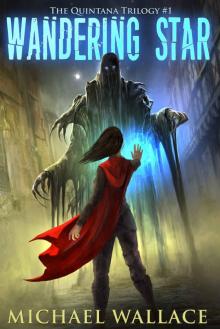 Wandering Star (The Quintana Trilogy Book 1)
Wandering Star (The Quintana Trilogy Book 1)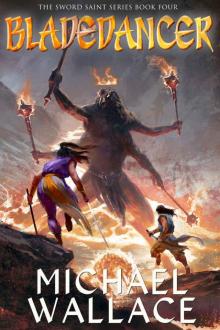 Bladedancer
Bladedancer Sword Saint
Sword Saint The Alliance Trilogy
The Alliance Trilogy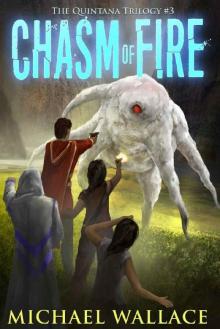 Chasm of Fire
Chasm of Fire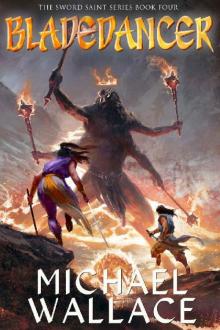 Bladedancer (The Sword Saint Series Book 4)
Bladedancer (The Sword Saint Series Book 4) The Devil's Deep
The Devil's Deep Shadow Walker (The Sword Saint Series Book 3)
Shadow Walker (The Sword Saint Series Book 3)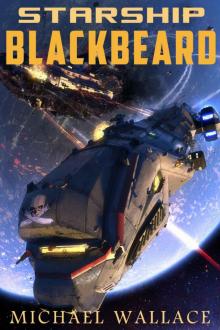 Starship Blackbeard
Starship Blackbeard The McHenry Inheritance (Quill Gordon Mystery Book 1)
The McHenry Inheritance (Quill Gordon Mystery Book 1)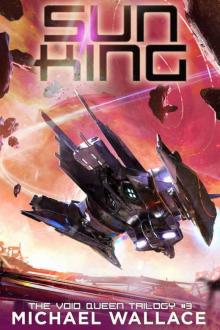 Sun King (The Void Queen Trilogy Book 3)
Sun King (The Void Queen Trilogy Book 3) Blood of Vipers
Blood of Vipers Righteous - 01 - The Righteous
Righteous - 01 - The Righteous I Scarce Can Die (Quill Gordon Mystery Book 5)
I Scarce Can Die (Quill Gordon Mystery Book 5) The Devil's Cauldron
The Devil's Cauldron The Wicked (The Righteous)
The Wicked (The Righteous) Crow Hollow
Crow Hollow Righteous03 - The Wicked
Righteous03 - The Wicked Righteous02 - Mighty and Strong
Righteous02 - Mighty and Strong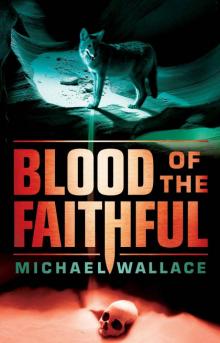 Blood of the Faithful
Blood of the Faithful Wash Her Guilt Away (Quill Gordon Mystery Book 2)
Wash Her Guilt Away (Quill Gordon Mystery Book 2) The Kingdom of the Bears
The Kingdom of the Bears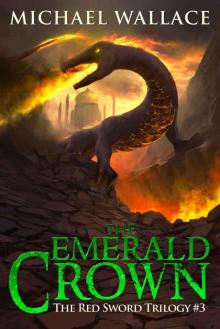 The Emerald Crown (The Red Sword Trilogy Book 3)
The Emerald Crown (The Red Sword Trilogy Book 3) The Dark Citadel
The Dark Citadel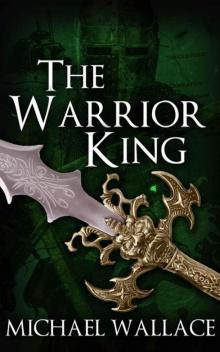 The Warrior King (Book 4)
The Warrior King (Book 4)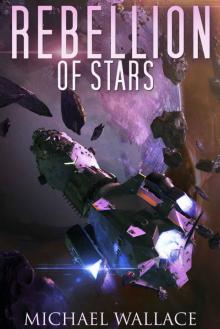 Rebellion of Stars (Starship Blackbeard Book 4)
Rebellion of Stars (Starship Blackbeard Book 4) Righteous04 - The Blessed and the Damned
Righteous04 - The Blessed and the Damned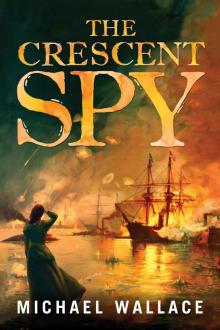 The Crescent Spy
The Crescent Spy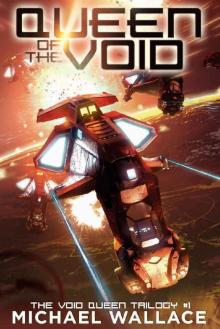 Queen of the Void (The Void Queen Trilogy Book 1)
Queen of the Void (The Void Queen Trilogy Book 1)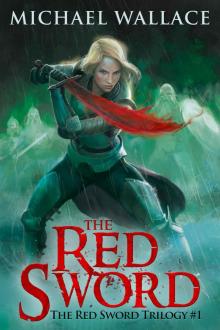 The Red Sword (The Red Sword Trilogy Book 1)
The Red Sword (The Red Sword Trilogy Book 1)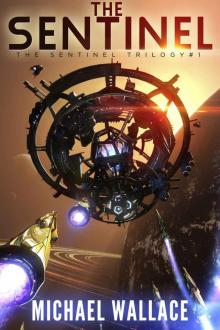 The Sentinel (The Sentinel Trilogy Book 1)
The Sentinel (The Sentinel Trilogy Book 1) The Golden Griffin (Book 3)
The Golden Griffin (Book 3) The Blessed and the Damned (Righteous Series #4)
The Blessed and the Damned (Righteous Series #4) Hell's Fortress
Hell's Fortress Not Death, But Love (Quill Gordon Mystery Book 3)
Not Death, But Love (Quill Gordon Mystery Book 3) Destroying Angel
Destroying Angel The Free Kingdoms (Book 2)
The Free Kingdoms (Book 2)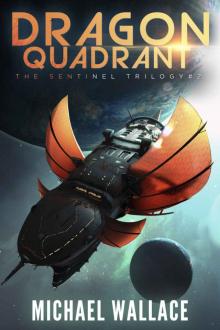 Dragon Quadrant (The Sentinel Trilogy Book 2)
Dragon Quadrant (The Sentinel Trilogy Book 2)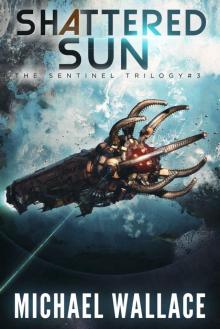 Shattered Sun (The Sentinel Trilogy Book 3)
Shattered Sun (The Sentinel Trilogy Book 3) The Wolves of Paris
The Wolves of Paris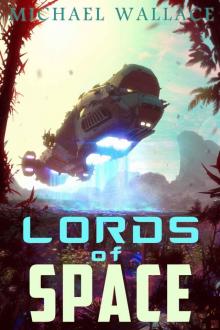 Lords of Space (Starship Blackbeard Book 2)
Lords of Space (Starship Blackbeard Book 2)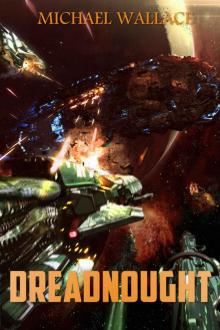 Dreadnought (Starship Blackbeard Book 3)
Dreadnought (Starship Blackbeard Book 3) The Village of Dead Souls: A Zombie Novel
The Village of Dead Souls: A Zombie Novel The Black Shield (The Red Sword Book 2)
The Black Shield (The Red Sword Book 2) The Daughters Of Alta Mira (Quill Gordon Mystery Book 4)
The Daughters Of Alta Mira (Quill Gordon Mystery Book 4) Mighty and Strong (The Righteous)
Mighty and Strong (The Righteous)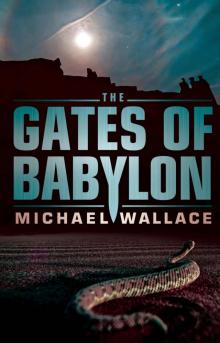 The Gates of Babylon
The Gates of Babylon